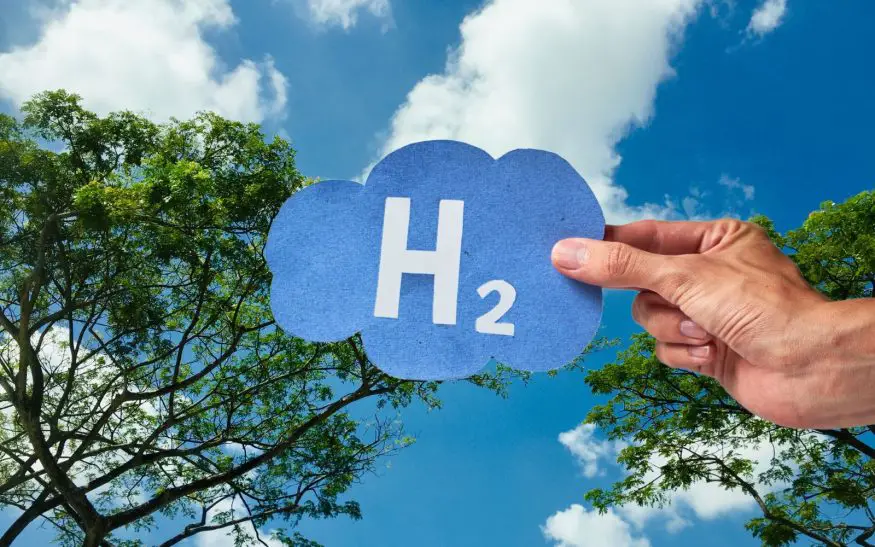
Why isn’t white hydrogen from the air collected for fuel?
January 3, 2023Since H2 is the most common element, many wonder why it isn’t sourced naturally from the air.
White hydrogen is the name given to H2 that occurs naturally in the air and is also referred to as natural hydrogen. Since it is the most abundant element in the Universe, it seems logical that we should simply be able to capture it from the atmosphere to use it as a carbon-free fuel. That said, it isn’t as easy as it sounds.
As light as H2 is, any of it naturally occurring in the air will rise and disperse.
As a result, very little white hydrogen occurs in the air around us, meaning that it is not simply waiting to be captured and used as a clean fuel source. The majority of white hydrogen isn’t available in the atmosphere as much as it is found in difficult – or impossible or unfeasible – locations.
White hydrogen is just as efficient and carbon-free as other forms of H2 but obtaining it can be an energy-intensive process.
To extract it, heavy machinery and fossil fuels must be used, which would ultimately contradict the goal of obtaining this form of hydrogen in the first place. Sources for natural H2 include serpentinization – a reaction between ultra-basic rocks and water; degassing from within the Earth’s crust and mantle; weathering, when water meets freshly exposed rock surfaces; contact between water and reducing agents held within the Earth’s mantle; decomposition of organic matter; hydroxyl ion decomposition found in mineral structures; natural water radiolysis; and biological activity.
It is for this reason that the global effort to use H2 as a zero-carbon emission source of fuel are focused on sourcing it in different ways, nearly none of which involve drawing it out of the air.

That said, just because most research is focused on methods other than pulling H2 from the atmosphere, this doesn’t mean that it isn’t being researched at all. In fact, scientists recently published a paper in the Nature Communications journal in which they described a process that can now produce H2 out of the humidity in the air.
This isn’t exactly white hydrogen, as it isn’t free-floating, but it is likely as close as we’ll come.
The method described by the scientists from the University of Melbourne’s Department of Chemical Engineering involve using the humidity from the air in an electrolyzer powered by renewable energy sources such as solar and wind. This concept is meant to help to bring green H2 to remote regions that are traditionally low in liquid water, pulling the H2O straight out of the air.
Our @engunimelb researchers have developed a way to generate hydrogen from air instead of the conventional method using fresh water. It could lead to a better way to store renewable power which doesn’t deplete scarce water resources.
Read more → https://t.co/pzP6D5Ft4S pic.twitter.com/ceBI5SOlHC
— University of Melbourne (@UniMelb) September 7, 2022
In conclusion, the authors of this paper have demonstrated that their method is successful in electrolyzing the water in the air’s humidity, even when it is as low as 4 percent. This breakthrough technology has the potential to provide new forms of sustainable energy sources for many dry and arid regions around the world.
More about natural hydrogen…
Article Update: 8/3/2023
Recent Discoveries of Geological White Hydrogen Deposits in France, Mali, and Canada
Recent discoveries of white hydrogen deposits in France, Mali, and Canada have sparked excitement and potential for the future of natural hydrogen as a renewable and carbon-free fuel source. In France, significant reserves of natural hydrogen were found in the northeastern Lorraine region, potentially revolutionizing the country’s energy landscape. Mali, too, unveiled vivid evidence of vast hydrogen stores through studies of seeps, mines, and abandoned wells. These findings have challenged the notion that pure hydrogen is rare in nature. Additionally, well-documented occurrences of hydrogen within copper mines in Ontario, Canada, and South African gold, platinum, and chromite mines further emphasize the global potential of natural hydrogen. Scientists and researchers are now exploring the utilization of white hydrogen, which is continuously produced in the earth’s crust, as an alternative and sustainable energy solution.



 With over 15 years of reporting hydrogen news, we are your premier source for the latest updates and insights in hydrogen and renewable energy.
With over 15 years of reporting hydrogen news, we are your premier source for the latest updates and insights in hydrogen and renewable energy.
Comment on your poll “Would you drive a hydrogen car if the lack of refueling stations weren’t an issue?” You left the option most relevant to me. I have had a Mirai for over 18 months. Suggest you add – “I already own a Hydrogen Fuel Cell Vehicle”
So, the way you explained the reason we can’t sorce hydrogen from the air, was given as, ” white hydrogen occurs in the air around us an therefore can’t be sourced? That doesn’t follow. Even if it is a fact. You did not give a valid reason. Because it’s in the air around us is not the reason it can’t be processed out of the air. Sorry that was just a little confusing an misleading.
Hydrogen
Since H2 is the lightest element, it disperses high in atmosphere. We have no technology to effectively capture the free H2. Instead, there is effective technology to remove water from the air and use it in an electrolizer.
Hurry and get hydrogen in cars and distribution at every fuel station ASAP.
3 years max for complete national coverage.
battery is 3x more efficient from electricity production to the wheels. I don’t see a reason to not equip hydrogen cars with a small battery like PHEVs. somewhere between 30-100miles of ev range that you can charge daily pans cover 90+ % of your driving. then use fuel cell as a range extender on long trips. you pay more per miles , for the convenience of filling up in 3 minutes and you get lighter weight, better efficiency, less tire wear during the rest of the year. maybe hydrogen tank AND fuel cell could be a modular hot swappable range extender unit that you don’t even need to carry when you’re just driving on electric. there is not point in storing hydrogen in your tank for weeks and let it leak, you should just put it when you need it
Electric battery is being pushed as the least expensive way to go.
Are road taxes being added to all those comparing fossil to BV. If you look at the electrical grid increase, charging stations, along with tons of material needed for batteries and the energy used to make them along with reprocess These batteries.
Put hydrogen stations up and we will come out much less expensive.
Hydrogen can power large and small trucks, planes, ships and trains even Nasa uses hydrogen for their rockets.
Hydro – gen – water generator
A station is badly needed in Barstow or at State Line so we can make to Las Vegas & back.
France has built a train that runs on Hydrogen and water. I believe it would be very beneficial to develop hydrogen power.
A hydrogen car is still an electric vehicle in every respect, except that the method of charging comes from a fuel cell. Make all of the electrics modular with small on board batteries and with add on batteries and fuel cells. But the lack of refueling stations will dampen any great adoption of hydrogen vehicles for some time.
I’m not a tree hunger nor do I buy off on the climate warming theory. However I am all for alternate forms of energy that is cheap, practical, sustainable and reliable. To date none have met those requirements and to do so without compromising!
Bike it to the desalinization station, or sail.
What about running an internal combustion engine on hydrogen? Like CNG or LPG.
If my concern for the amount of toxins we are adding to our air our water and our soils labels me as a tree hugger and so be it. Do a bit of research on the topic of ocean floor mining for the purposes of gathering the Rare Earth elements required to make batteries and then tell me how you feel about battery technology versus hydrogen.
No idea how deep sea mining has struck you; seems like an okay way to get cobalt and nickel (but I haven’t permitted, built and operated a deep sea mining op.) Batteries and hydrogen both call for transition metals, and a graphene and/or silicon anode line or two…
Another issue not addressed is safety in manufacture, fueling and storage. Once the *safe* infrastructure is in place I suspect costs will come down.
What would make H2O particularly attractive is being able to generate H2O at home as you can with LAVO equipment which is currently fairly expensive but it is more sustainable than a normal EV as it dies not put pressure on grid in the same way even if you use brown H2O
Here in the Netherlands.
The first couple gas stations are already equipped with h2.
That is at least promising when more cars get Available that they can fill up there tank.
And then we can finally get rid of the questionable oil producing countries